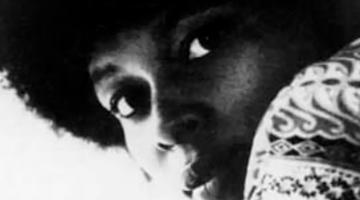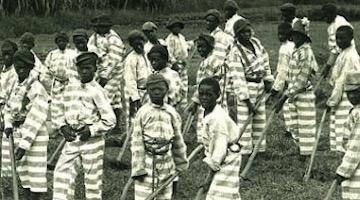Incarcerated activists have so many tools and skills to teach about resisting brutal regimes.
“Penal space is both the built environment of carceral facilities and also the social relations structured through cacerality.”
In this series, we ask acclaimed authors to answer five questions about their book. This week’s featured author is Nicole Fleetwood. Fleetwood is Professor of American Studies and Art History at Rutgers University. Her book is Marking Time: Art in the Age of Mass Incarceration.
Roberto Sirvent: How can your book help BAR readers understand the current political and social climate?
Nicole Fleetwood: The book examines the conditions under which incarcerated artists create works and use art to connect with other people in prison, loved ones, and a broader public. I also engage practices by nonincarcerated artists who make work interrogating the carceral state. I theorize how penal space, penal time, and penal matter shape the aesthetic horizons and art practices of these artists. In the simplest terms, I discuss penal space as both the built environment of carceral facilities and also the social relations structured through cacerality. With penal time, I analyze the measurement of time as punishment for captive people; and with penal matter, I focus on racial and extractive capitalism and the material constraints under which people create.
The book was released on April 28 during the COVID-19 pandemic where nonincarcerated people with means and resources are sheltering in domestic space, spending time with loved ones, and working from home while unhoused people and people considered “essential workers,” but really they are deemed as disposable workers, are not able to shelter in place, work remotely, and recalibrate time around their domestic lives.
“Penal space, penal time, and penal matter shape the aesthetic horizons and art practices of these artists.”
We are witnessing how disposability and exposure are made even more extreme in carceral facilities where people are warehoused in close quarters—crowded into penal space and have no control over their mobility (i.e., social distancing). Largely officials refuse to release people from carceral facilities because the logic of carcerality is that they must suffer as a measurement of punishment as time in captivity.
Reports estimate that over 70% of people in federal US prisons are positive with COVID-19.[i] At Marion and Pickaway prisons in Ohio, over 80% of incarcerated people are infected.[ii] We are witnessing the state produce mass death. At the same time, directly impacted people—inside and outside—are fighting to get people released, to find safe places for them to shelter once they are released, and create structures of care. For example, Mary Enoch Elizabeth Baxter, a formerly incarcerated artist who is featured in my book, is active in groups in Philadelphia bailing people out of jail and finding other ways of supporting system-impacted people.
What do you hope activists and community organizers will take away from reading your book?
I hope there are a few takeaways. In the book, I was working to document a range of practices that reverberate, that speak to each other, that build connection. I hope that the book affirms a sense of community among people fighting from various sites—from penal isolation to halfway houses to educational and cultural institutions, and beyond—to abolish prisons. We are not all afforded the privilege of affirmative companionship and chosen community. Mark Loughney, one of the artists featured in the book who is still in prison, wrote me after reading the book, “I feel like my prison experience of art making in prison, and the hurdles that come with it — my fears and hopes and goals... all of me — finally I'm not alone in it and can see that there are so many others like me. It feels like a huge weight has been lifted, like I don't have to keep trying to convince people what this whole experience is.” That is why I wrote the book. I want people to be and feel recognized. I want to be a participant in creating a radical and loving sense of belonging.
“I want people to be and feel recognized.”
I also hope that nonincarcerated organizers and activists recognize the importance of the organizing and activism that take place inside prisons and acknowledge how incarcerated activists have so many tools and skills to teach about resisting brutal regimes. In the book I write, “There are lessons here, developed by the punished and imprisoned, about how to create, to forge relations, and to embody and represent one’s life under unimaginable conditions. From these lessons, we learn about a society that relies on punitive confinement as a solution to myriad social, economic, political, ecological, and health crises. Prisons—indefinite detention, parole, concentration camps—exist inasmuch as we allow them to.”
We know readers will learn a lot from your book, but what do you hope readers will un-learn? In other words, is there a particular ideology you’re hoping to dismantle?
Well the entire book is about me learning from people willing to share how they use creativity to manage penal isolation, captivity, societal rejection, legal bondage, suffering. I want people to un-learn who teaches and who learns, where knowledge and wisdom come from.
Like many working to carcerality, I want people to un-learn how we have normalized punitive governance.
I also hope the book offers fresh insights onto the production of art, who makes it, who collects it, and how it circulates.
Who are the intellectual heroes that inspire your work?
I am an enormous fan of Angela Y. Davis. Since I was a teen, I have admired her. And the more I learn from her life, activism, and writings, the deeper my admiration grows.
I am so inspired by the research and scholarship on prison and abolition by a range of scholars and activists, especially black feminists like Ruth Wilson Gilmore, Elizabeth Hinton, Sarah Haley, Ruha Benjamin, Kali Nicole Gross, Donna Murch, Mariame Kaba, and others.
On art and black cultural theory, I have been enormously influenced by Deborah Willis, Cheryl Finley, Erica R. Edwards, Evie Shockley, Shana Redmond, Saidiya Hartman, Herman Gray, Karla Williams, and others.
On all things related to writing, thinking, and black life: Fred Moten.
My most influential intellectual—and life--role model is my grandmother, Barbara Jean Fleetwood. She’s no longer here. She had a 9thgrade education. She read every day in the morning and at night. She was philosophical and spiritual and believed that the deepest matters could be expressed in simple and clear ways; and everything she did came from a practice of love and care.
In what way does your book help us imagine new worlds?
I think of Marking Time as all about imagining new worlds—worlds where prisons, punitive police, and anti-black state violence are no longer. The book is about how people held in punitive captivity envision, create, and manifest in some of the most austere and dehumanizing conditions of modern life. Art is at the center of the book, but I position prison art as a visual guide for readers, especially nonincarcerated readers, to rethink what they think they know about prisons and imprisoned people. And I attempt to do this by listening to and foregrounding the art and narratives of people who have experienced incarceration. I am their student; I’m learning from them. I hope the book offers lessons and strategies for us all and is part of a larger, robust movement to end caging and punitive governance.
I am most inspired by the relational practices and forms of belonging created by directly impacted people and between their loved ones and allies. I want the book to communicate the necessity of imagination and creativity to freedom struggles. Abolition is imagining and enacting a world yet to be.
Roberto Sirvent is Professor of Political and Social Ethics at Hope International University in Fullerton, CA, and an Affiliate Scholar at Yale University’s Interdisciplinary Center for Bioethics, where he directs the Race, Bioethics, and Public Health Project. He is co-author, with fellow BAR contributor Danny Haiphong, of the book, American Exceptionalism and American Innocence: A People’s History of Fake News—From the Revolutionary War to the War on Terror.
COMMENTS?
Please join the conversation on Black Agenda Report's Facebook page at http://facebook.com/blackagendareport
Or, you can comment by emailing us at comments@blackagendareport.com



















